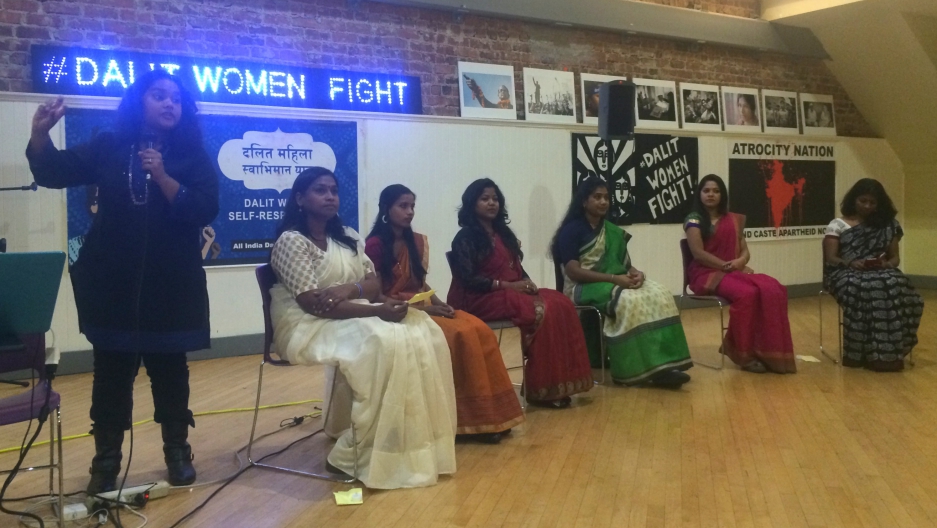What can the Black Lives Matter movement contribute to the field of international development?  In order to advocate on behalf of India’s most marginalized citizens, Delhi-based All India Dalit Women’s Rights Forum has teamed up with Black Lives Matter activists. Through a shared history of oppression and inequality, low-caste women in India and communities of color in the United States are learning from one another.
In order to advocate on behalf of India’s most marginalized citizens, Delhi-based All India Dalit Women’s Rights Forum has teamed up with Black Lives Matter activists. Through a shared history of oppression and inequality, low-caste women in India and communities of color in the United States are learning from one another.
Caste discrimination in India, like racial discrimination in the United States, has deep roots in culture, society, and religion. Deemed “untouchables” for over 4,000 years, India’s Dalits are currently the world’s oldest surviving oppressed group. The term Dalit literally means “the crushed ones” in Hindi, a term that came to wide use in the twentieth century as a self-chosen political name.
I am struck by the unfortunate similarities in violence faced by Black Americans and Indian Dalits. Despite the passage of laws and social initiatives, the struggle for Dalit equality continues in India today. In the United States, African Americans continue to be killed by police, profiled while shopping, and targeted in hate crimes. In India, many (if not most) Dalit women have suffered sexual abuse. According to India’s National Crime Records Bureau, the two most common crimes against lower-caste people were sexual assault and rape.
Activist Sanghapali Aruna Lohitakshi explains that often when a Dalit woman is assaulted, “Nobody bothers. Not even the police, not the administration, not the doctors, not the state.” Her statement reflects a similar frustration in American society – So many black men and women have been killed by police officers, their deaths caught on videotape, with no conviction in a courtroom.
All India Dalit Women’s Rights Forum recognizes these parallels. Rape and sexual assault of Dalit women can not be fully understood without acknowledging caste. Many Indians deem caste a thing of the past, just as many Americans are uncomfortable talking about race as a contemporary issue.
Black Lives Matter activists are not the first to create global networks with other marginalized groups. Those who struggled for equality in the past recognized that their struggle was closely linked to oppression around the globe. In the summer of 1946, B.R. Ambedkar, the architect of the Indian constitution and anti-untouchability activist, reached out to American civil rights activist W.E.B. Du Bois. Du Bois had sent a petition to the United Nations on behalf of Black people in the United States, and Ambedkar requested a copy. He hoped to draft a similar petition for Indian Dalits. Ambedkar described himself as a “student of the Negro problem” and wrote that “there is so much similarity between the position of the Untouchables in India and of the position of the Negroes in America that the study of the latter is not only natural but necessary.” Du Bois responded with eagerness to collaborate with Ambedkar.
My hope for us, as a nation, is to re-think how we treat those who are born into systems of oppression – Both here at home and internationally. Activist and philosopher Cornel West also espouses that African Americans and Dalits share a common struggle for equality and that “it’s time that the Dalit agenda became part of a mainstream discourse in black and other solidarity organizations.” In today’s global society, we are able to establish solidarities across geographic borders. Activists in the United States can, and should, integrate struggles for equality in developing nations into their narrative and discourse.
References:
Manan Desai, “What B.R. Ambedkar Wrote to W.E.B. Du Bois”; https://www.saada.org/tides/article/20140422-3553
Sonia Paul, “From Black Lives Matter, Activists for India’s Discriminated Dalits Learn Tactics to Press for Dignity”; https://www.pri.org/stories/2015-11-08/black-lives-matter-activists-indias-discriminated-dalit-learn-tactics-press
Cornel West and Suraj Yengde, “A Shared History of Struggle Should Unite India’s Dalits and African Americans in the Fight for Equality”;
https://www.theroot.com/a-shared-history-of-struggle-should-unite-india-s-dalit-1795973401

Leave a Reply
You must be logged in to post a comment.